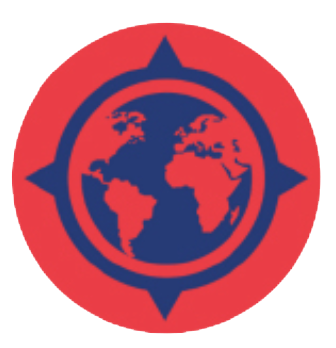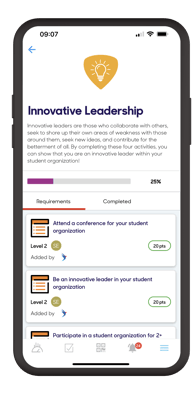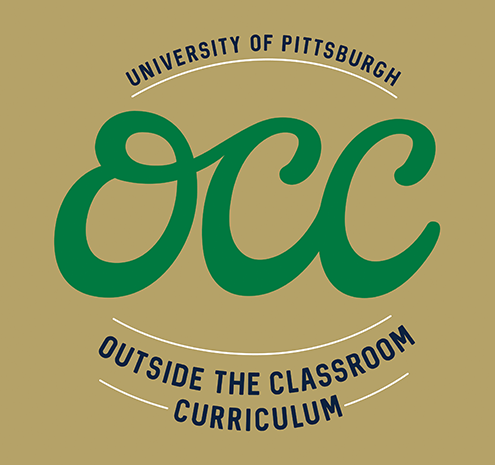
Description
The School of Business at the University of Kansas is helping students' careers take flight through its EY Professionalism Program. A key to the success of the program is its Platform for Professional Excellence (ePlatform) that expands students' foundational knowledge, elevates student resumes, and gives business students an advantage in the competitive job market. By utilizing Suitable’s web and mobile software, KU Business is able to track co-curricular learning and promote competency development through various activities outside of the classroom
About the School
Home to the Jayhawks, the University of Kansas is a public research university with its main campus in Lawrence, Kansas that was founded in 1865. Given that KU’s School of Business is growing, the school is located in Capitol Federal Hall, one of KU’s newest buildings on campus. Between direct admits from high school and students from competitive admissions, KU Business has around 3,000 undergraduate students who can study one of six major areas alongside various minors and certificates.
Challenges before Suitable
In 2018, the Dean of KU’s School of Business formed a task force consisting of employers, alumni, faculty, and more to develop a program that ensured its students had skills and competencies that employers were looking for without taking away from the traditional classroom experience. To begin, the task force surveyed alumni to understand what skills they wish they had when graduating from KU. On top of that, the team researched various co-curricular programs at peer institutions around the country as inspiration.
After two years in development, KU launched its program in 2020 with one cohort of students as the COVID-19 pandemic began. Adding onto the tumultuous time, KU Business had multiple changes in leadership and staffing. New faculty was building up the program while more and more students were completing it, but the program wasn’t even complete. Given this, KU hired Matt Lancaster as the program’s director to monitor and manage the program. As Matt became accustomed to KU Business, he realized that the school had no metrics for tracking extracurricular involvement or internships.
Fortunately, KU Business discovered Suitable. From unparalleled engagement tracking to personalized student dashboards, KU is able to streamline its administrative approval workflows and communicate effectively with its students so that they can articulate their professional excellence.
Life with Suitable
Finalized during Summer 2022 was a generous gift from Ernst & Young that provided KU’s School of Business with the funds to host opportunities for students that enhance their professional development. After receiving this donation, KU rebranded their co-curricular program to the “EY Professionalism Program".
This past academic year was the first full year of the EY Professionalism Program, meaning all students enrolled at KU Business are required to participate and complete the program to graduate. The program features six 1-credit courses focused on career and professional development. Throughout the six courses, Business Jayhawks learn about career topics while earning technical skill certifications that make them stand out in the job market. For example, the first class students take is Introduction to Professionalism, which teaches students about proper study habits, establishing a personal brand, and how to network with professionals.
Also part of the program is the Platform for Professional Excellence, also called the ePlatform. Powered by Suitable, the platform allows students to track activities and certifications while earning ePoints and badges required for graduation. Business Jayhawks earn ePoints by participating in five different flight patterns, which are equivalent to competencies. The five flight patterns are as follows:
- Core Skills, Development, and Certifications
- Career Planning and Networking
- Student Leadership and Engagement
- Experiential Learning
- Global Mindset
This past year, students only needed to earn 200 ePoints across any of these five competencies. To ensure students are well-rounded in all five competencies, KU is working to ensure a minimum point requirement in each competency. As students earn ePoints, they also earn badges as outlined below:

For Business Jayhawks who achieve mastery of all five competencies and earn 500 ePoints, they receive the Dean’s Badge of Excellence at an awards ceremony with the Dean in addition to special graduation regalia.
In addition to those five badges, there are also micro-badges students can earn. For example, the Innovative Leadership micro-badge can be earned if a student is involved in a student organization for two or more years and held a leadership role or planned a special event. Incentives for completing these micro-badges include coffee with employers and LinkedIn endorsements.

Another one of Suitable’s features is the leaderboard. KU has launched a leaderboard competition in which the top three student point earners for each month receive a gift card to the on-campus coffee shops and recognition on the campus televisions. Besides using the leaderboard for individual students, KU also uses Suitable’s group leaderboard to host competitions among student organizations. Student organizations that have the most engagement and highest quality activities can earn funds to attend a conference of their choice.
ASK THE ADMINISTRATOR
"For what you get when you implement Suitable school-wide, there isn't a better value out there in terms of student engagement."
Matt Lancaster
Program Director, EY Professionalism Program, The University of Kansas School of Business
Outcomes Achieved
With the help of the EY, the Professionalism Program at KU Business has grabbed the attention of other employers who now want to get involved, such as Koch Industries. This employer wanted to strengthen their recruiting pipeline and increase awareness of their brand, so they developed the Koch Industries Communication Series. Students applied to be part of this 5-week program that develops soft skills, such as communication and problem-solving. At the end of the series, Koch Industries awarded two students with $3,000 scholarships based on their participation and engagement in Suitable.
KU’s School of Business uses Suitable’s real-time data collection to track key metrics, such as student engagement and badge completions. From last year, student engagement has increased by 12% to 62%. This is a conservative estimate as it includes students who aren’t required to complete the EY Professionalism Program. Matt estimates the student engagement of students fully immersed in the program to actually be around 80%!
Plans for the Future
KU’s School of Business has many plans for the future with Suitable and the program. Employer partnerships have been a big success, so much so that KU wants to introduce employer badges. These badges would feature activities that build skills that employers believe are of value. Possibly with the help of industry partners, KU Business looks to invest resources into expanding programs that help students further develop soft skills.
With Suitable, KU’s School of Business has been able to collect crucial student involvement data that can inform various student outcomes (i.e. retention) and can be used in AACSB accreditation and continuous reporting. This means KU can also track when students start to disengage, then proactively build procedures and interventions for those students to get them back on track.
By next academic year, KU Business will have met with the Undergraduate Business Council to establish standards for new activities and badges. Alongside that, the school plans to adjust competencies as needed to encourage completion of activities and align with industry expectations. With industry partner support, KU also hopes to finalize its incentivization and communication plans.
In the long run, KU wants to work with its faculty on the school’s existing longitudinal outcomes survey to assess the impact of the EY Professionalism Program. Beyond that, KU’s School of Business hopes to develop campus-wide advising relationships to increase awareness of the program outside of the business school while always continuing to evaluate and increase the value offered to their students.




.png)